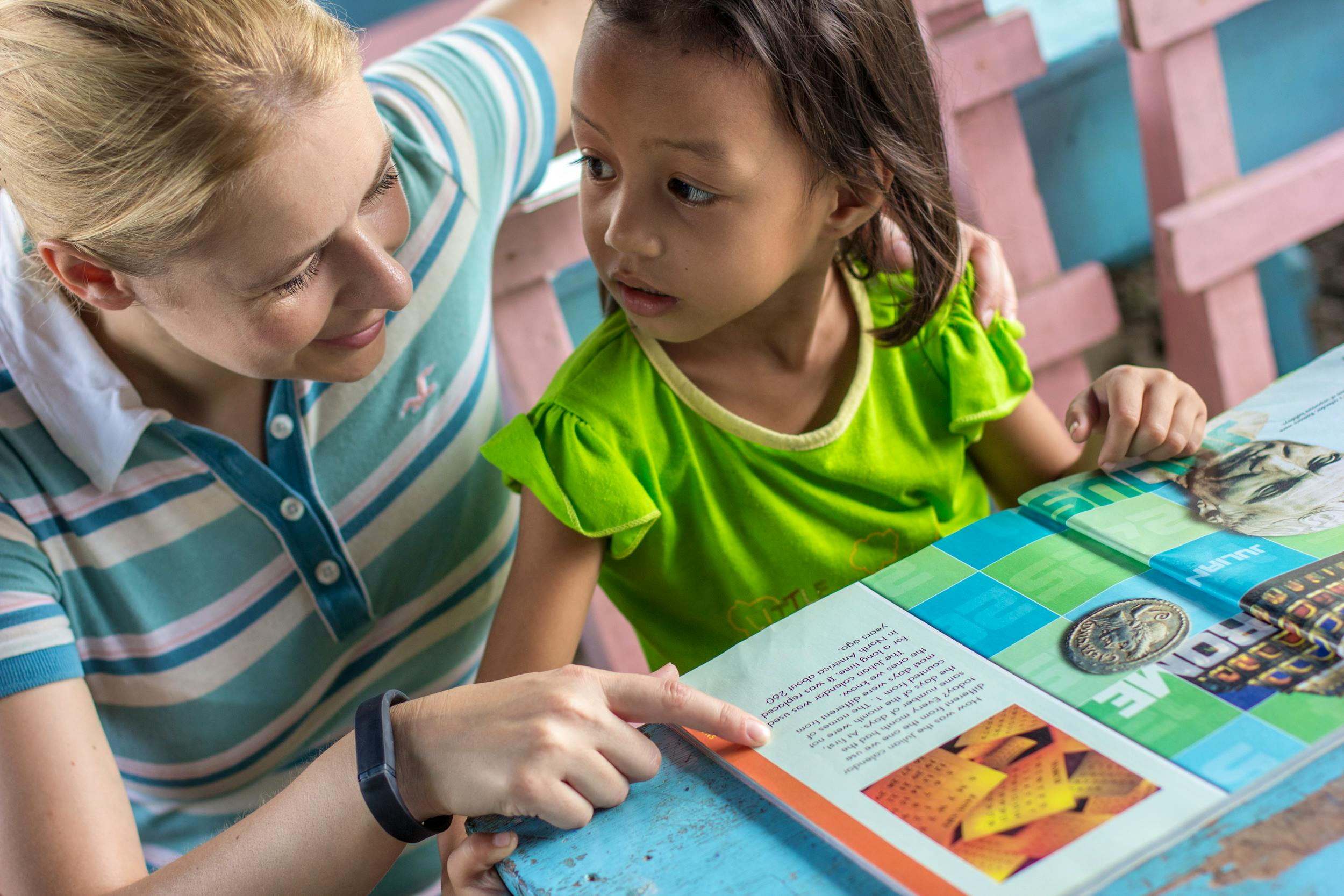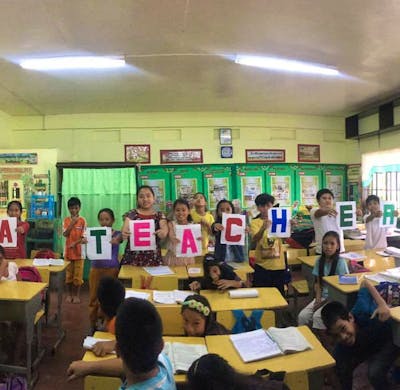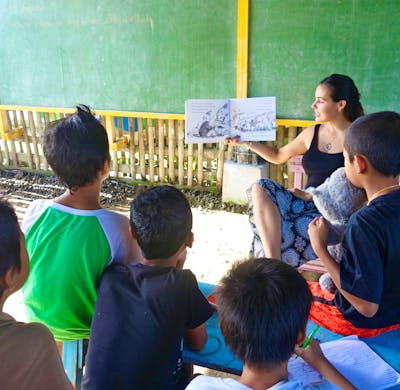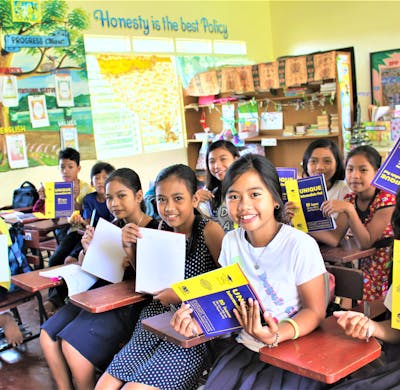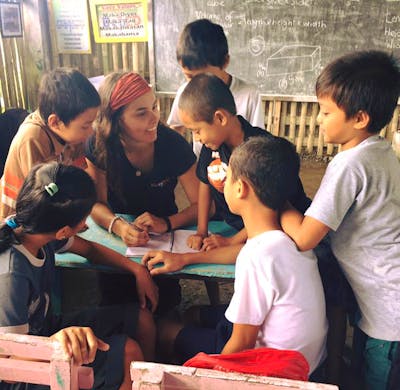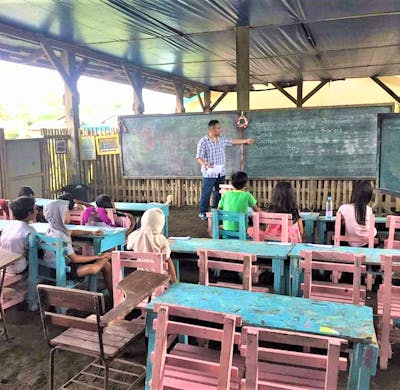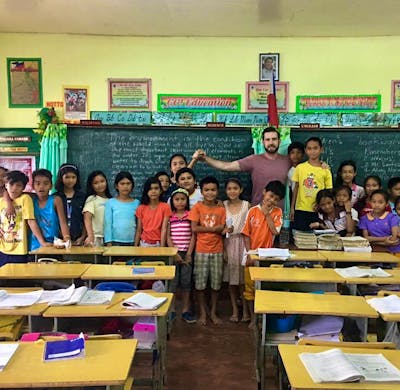About the Program
You will be of great use to rural schools if you decide to volunteer to teach English in the Philippines. There is a strong national emphasis on the importance of being able to speak, read and write English as all good jobs require proficiency in English. Learning English is incredibly important and getting off to a good start in elementary school is critical. Unfortunately, many rural elementary schools are overcrowded and lack sufficient textbooks and teaching material. Often, the only classroom equipment available is a blackboard. Children are often squeezed into small classrooms, and most schools do not have a library.
The teachers at these rural schools by and large are capable and are incredibly dedicated. Like teachers elsewhere, they often have to use personal funds to purchase classroom supplies. However, teachers in the Philippines like those in most other developing countries are not well paid and can ill-afford to use their own funds.
The low salaries and poor working conditions have led many experienced teachers to quit and work abroad, where salaries are much higher. Some of the teachers you will work with may not be fully proficient in English, even though they have good teaching skills; professional development opportunities are very limited for them. A native English speaking volunteer, who lacks teaching experience, could team up with that teacher to serve as a language tutor.
Most subjects, including mathematics and science, are taught in English. Volunteers who can also teach those subjects as preferred. There's also an increasing need for Music teachers who can teach the children how to play different musical instruments or how to sing as these kids are very much interested in those fields and have also hidden talents when it comes to music.
Why We Need You?
Given the dire condition of our rural elementary schools, you will be providing valuable support to overburdened teachers. With respect to the children, most of them have had very little contact with foreigners so they will be very interested in a new volunteer. Filipino students are eager learners and respectful towards their teachers, but like students elsewhere, they will lose interest unless they can be engaged and stimulated by the instructor.
The students have grown up speaking Waray-Waray, the local dialect, and will have to contend with learning two other languages, English and Filipino, the national language, in school. That’s a lot to ask of young children, especially the students in our rural school who have little opportunity to speak Filipino or English outside of the classroom. Your objective should not be to teach the intricacies of grammar; this is something the children can get from their textbook. Your objective should be to motivate the children to learn English. As educators are aware, students can best be engaged when lessons are organized, relevant, challenging, interesting, and interactive, and also when the instructor is enthusiastic, emphatic, and encouraging.
Duties will depend on the volunteer’s experience and skill level as well as classroom needs, but may include developing lesson plans, conducting classes, and working with small groups of children. Non-professional volunteers may assume duties as teaching assistants, language models, and individual or small group tutors. It would be helpful if volunteers brought their own instructional aids, such as hand puppets (for interactional skits), flash cards, posters and other lightweight material that can fit in a suitcase.
Please understand that placements can vary
due to local changes and as a volunteer you are expected to help out where
needed, as well as achieving some of your own personal goals. Flexibility is expected as needs change and
situations arise.
While you are in the Philippines you
should be prepared to work with the local project team to make your placement
as successful as possible. Good attendance, a great attitude and the
willingness to exchange ideas and skills with those you work alongside, will go
a long way to making your volunteering placement a success.
Project Profile
The rural elementary schools are located in the rural villages of Tacloban City's neighboring towns of Palo and Tanauan. Canggumbang Elementary School is located in Palo, the town next to Tacloban City while Mohon and Tugop Elementary Schools are located in Tananuan, a town next to Palo. They can be reached via jeepney. Travel
time is between 40-60 minutes depending on the pace of the vehicle.These are all government elementary schools under the
supervision of the Department of Education.
The school staff is composed of the school principal or head teacher and grade school teachers including the kindergarten teacher.
For concerns while on the project, it is recommended that the volunteer speak
with any of the teachers, in particular the homeroom teacher of the class
he/she will be handling.
These schools are open to provide
education to children from kindergarten to sixth grade. Children in kindergarten
can be as young as 5 years old. Average age for first graders is 7, second
graders 8, third graders 9, fourth graders 10, fifth graders 11, and sixth
graders 12. The fifth and sixth graders are sometimes combined into one class due to lack
of teaching staff.
There may be children older or younger
than their classmates in a particular class. Some children attend school at an
earlier age, some late, or others even skip school for a year or so.
Purpose of
the program
Volunteer for the Visayans opened the
teaching project to provide support to the school. There is only one teacher
per class handling several subjects in a day. Class population varies but
usually between 25-35 in rural areas. The subjects the teacher handles include
Math, Science, English, Physical Education, History, Music. Class is open from
Monday to Friday except during holidays and school activities. Class starts at
around 8:00 am, pause for lunch break at 12:00 noon and resumes at 1:00 pm to close at 4:00 pm.
As a placement, the school benefits
from having an extra teacher who can help in teaching English, Math, Science,
or Music depending on the preference of the volunteer. Having a foreign
volunteer who speaks English is useful as it gives the children the chance to
learn and practice the language. In the Philippines, a good grasp of the
English language is an advantage in employment. At the same time, the volunteer
serves as role model and inspire these children study for a better future. On a
different note, a volunteer helps reduce the homeroom teacher’s load. When a
volunteer is present, the teacher finds the time to do other tasks such as
writing reports.
Role of the Volunteer
The volunteer’s role is in fact not as
teacher assistant but as the actual classroom teacher. He/she replaces the
local teacher for a particular period of time daily. The local teacher may or
may not be in the classroom while the volunteer is conducting class. Often
times, the local teacher will be working on something else while the volunteer
is holding classes.
The volunteer is required to work from
Monday to Friday for at least 4 hours. Normally volunteers report to work in
the morning from 8:00 am until 12:00 noon. A few volunteers would sometimes extend their time to teach
in the afternoon as well.
The volunteer’s role is to teach
his/her class with his/her preferred subject, e.g. English. He/she has to
prepare his/her lessons before coming to class. At the beginning before
officially working, the volunteer will visit the school for the placement
orientation. During this time, the volunteer will be provided an outline of the
topics to be discussed. It is up to the volunteer to prepare the lessons and
deliver them in class.
The school has no references the
volunteer can use to he/she has to rely on the internet. The volunteer can
utilize the free afternoon to prepare lessons for the following day. The VFV
has internet connection so the volunteer can have access to it. However, too
often connection at the office can be slow especially if too many volunteers
are using it at the same time so another option is to visit an internet café.
The volunteer must provide his/her own
teaching materials because the school has limited resources.
The volunteer must not be surprised to
see some of his/her students come to class without pen or paper. Some of the
children who attend the class come from poor families.
Dress Code
To conform with the Filipino
conservative culture and to look professional, volunteers must dress modestly.
The volunteer must report to work wearing the appropriate clothes.
Top must consist of shirt of blouse or
t-shirt with sleeves. No singlet or tank top. Top should not have plunging
neckline. Bottom wear must be long pants or knee-length skirt. Footwear must be
shoes or sandals.
Outside work, a volunteer can wear
more comfortable article of clothing such as shorts and tank tops and wear flip
flops.
Transportation to the Placement
During placement, the volunteer will
take public transportation. Please be patient when traveling between home and
placement. Rural Elementary Schools can be reached in about 40 minutes to 1 hour depending on the distance from Bliss but waiting for a jeepney and
motorcycle “habal-habal” or tricycle can take longer than 10 minutes. There is
no specific schedule for a jeepney’s, motorcycle’s or tricycle’s trip. Jeepneys
just come along anytime, hence a time should be allotted in waiting for them.
Jeepneys normally stop quite often in
its route to pick up or drop off passengers. Motorcycle and tricycles wait for
as many passengers to fill up the vehicle before leaving the terminal.
Jeepney and tricycle fares ranges from 0.20 to 0.30 USD depending on the distance. Volunteers will be briefed on getting
to placement and back to Tacloban during the placement orientation at the
beginning of the program.
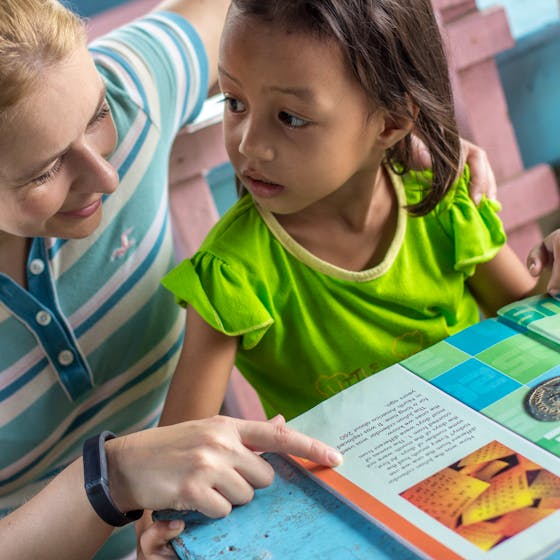
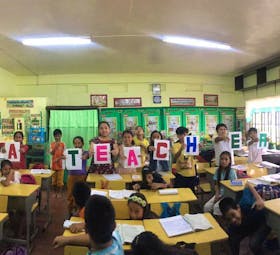
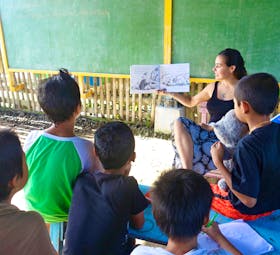
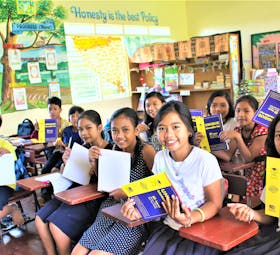
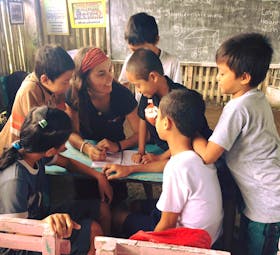

 5
5

